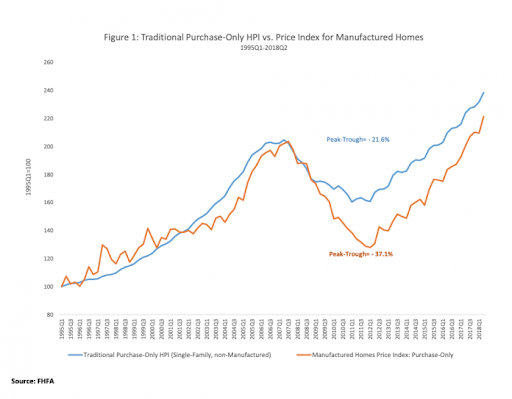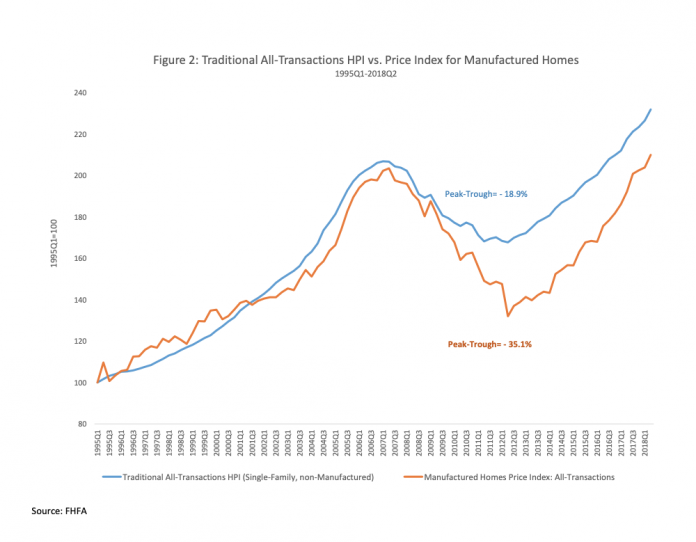
It's a common misconception that mobile homes immediately depreciate after the initial sale as cars do. It's impossible to say that every manufactured home will appreciate over time and hold its value. Still, according to a detailed FHFA report, we can see that mobile homes appreciate very similar to stick-built homes. Contrary to popular belief, mobile homes' values do tend to appreciate over time rather than depreciate.
Are you looking for the mobile home of your dreams? Let Home Nation help!
How Is the Value of Mobile Homes Calculated?
There are two ways to determine a mobile home's value -- market-based appraisals and the NADA book value. In today's market, a mobile home's book value doesn't give a reliable and accurate number regarding a manufactured home's actual value. Market-based appraisals are the best way to calculate a mobile home's value and find out if they have appreciated or depreciated.
Related: How Much Does a New Mobile Home Cost?
Market-Based Appraisals
Market-based appraisals are the same method used to determine the value of a stick-built home and are the only way to gauge the total worth of a mobile home accurately. Two main factors play into calculating the market-based appraisal:
- A thorough inspection of the interior and exterior of the mobile home
- The research of recent and similar manufactured home sales in the area
After inspecting the home and researching other mobile homes' values in the area, these numbers can be analyzed to produce an unbiased and expert opinion of the manufactured home's value.
What Affects the Cost of a Mobile Home?
The initial cost of a mobile home can vary wildly depending on many factors. Some of the most significant aspects that affect the price of manufactured homes are:
Size
Its size significantly influences the value of a mobile home. Typically, manufactured homes are either single, double, or triple-wide, and these can range anywhere from 600 to over 4,000 square feet. Larger houses have a greater initial cost.
Age
Age is another determining factor in pricing a mobile home -- specifically if it was built before or after 1976. The HUD code, effective since 1976, regulates the build quality and safety of manufactured homes. Homes built before this code are much more challenging to get financing for.
Exterior
The main parts of the home’s exterior that affects the cost are the condition of the roof and walls. Another critical factor is the leveling of the manufactured home -- if it’s not level, it can lead to significant problems down the road.
Interior
The fixtures and features of the inside of a mobile home greatly affect the price -- things like kitchen appliances, cabinets, cupboards, bathrooms, and sinks. The condition of the floors, ceilings, and walls also play a large part in the initial cost of a mobile home.
Appreciation: Manufactured Homes Vs. Stick-Built
Related: Buying a Used Mobile Home
Purchase-Only Index

The purchase-only index takes the homes' initial purchase values into account, and we can learn a lot about the appreciation and depreciation of site-built and manufactured homes by looking at the graph above.
We can see that both homes follow the same general when it comes to their total value. While there are slight differences, the FHFA report shows that manufactured homes appreciate and depreciate similarly to stick-built ones.
The report also answers another question; do mobile homes last as long as traditional stick-built ones? It looks like a strong yes; whether your home is manufactured or site-built, it will retain and gain value over time with the proper upkeep and maintenance.
All-Transactions Index

The all-transactions index, which also takes mobile home appraisal values into account, shows the same trends as the purchase-only graph. The FHFA uses the same methodology to value these indices when creating their quarterly house price index.
The FHFA's report, along with these two indices, shows how mobile homes' value correlates very closely with stick-built houses.
What Affects Mobile Home Appreciation?
Datacomp, a company specializing in the valuation of manufactured homes, analyzed 88,000 real mobile home sales to find out why some of them depreciate while others appreciate in value. Many factors affect the price fluctuations of manufactured homes, but the house's location is one of the most significant -- it can affect the cost by more than 24%.
The location factor mostly means that if a manufactured home sits on its own property, it is more likely to increase in value than in a park. With more and more retirees purchasing mobile homes in 55+ communities, home prices continue to stay consistent and increase in value over time.
Some of the other significant factors that affect the appreciation of a mobile home are:
- The housing market in the area that the house is located in has a substantial impact on the mobile home's future value
- The community where the house sits similarly impacts the future value of the manufactured home
- The initial price that the home was bought or sold at
- How new or old the house is
- The inflation rate
- The cost and availability of community sites reflect how supply and demand influence the home's future value
- Organized resale networks -- areas with an organized system usually have higher selling prices than in markets without one.
So, Do Mobile Homes Appreciate in Value?
Looking at all of these factors, the answer is yes -- most of the time. There’s no guarantee that a mobile home will appreciate in value, but there’s also no guarantee for stick-built homes either. Manufactured homes will typically appreciate in value over time as long as they are well-maintained.
Did you know that Home Nation makes buying a mobile home easy?
Related: Modular Home Construction Loans





